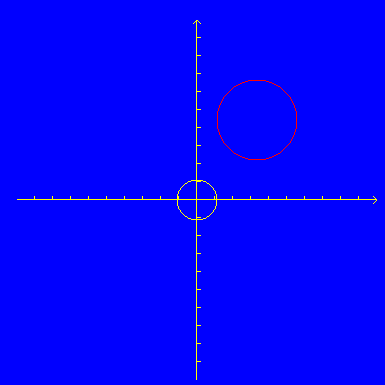Python之OpenGL笔记(21):描点法画圆
一、目的
1、描点法画圆;
二、程序运行结果
三、说明
描点法画圆函数drawCircle( x0,y0,R)
圆心坐标x0,y0 ;半径R
等分角A=2π/等分数;则圆上任一点坐标 x=x0+RcosA;y=y0+RsinA;z=0
将圆上的每个点坐标存入数组返回。
四、glDrawArrays方法
在OpenGl中所有的图形都是通过分解成三角形的方式进行绘制。
绘制图形通过GL20类中的glDrawArrays方法实现,
该方法原型: glDrawArrays(int mode, int first,int count)
参数1:有7种取值
1.GL_POINTS 画点
2.GL_LINES 画线段,每一对顶点被解释为一条直线;
3.GL_LINE_LOOP 用给出的点绘制为一个环(所有的点首尾相接)。
4.GL_LINE_STRIP 一系列的连续直线;
5.GL_TRIANGLES:每三个顶之间绘制三角形,之间不连接
6.GL_TRIANGLE_STRIP 顺序在每三个顶点之间均绘制三角形。这个方法可以保证从相同的方向上所有三角形均被绘制。以V0V1V2,V1V2V3,V2V3V4……的形式绘制三角形;
7.GL_TRIANGLE_FAN:以V0V1V2,V0V2V3,V0V3V4,……的形式绘制三角形
参数2:从数组缓存中的哪一位开始绘制,一般都定义为0
参数3:顶点的数量
五、源代码
"""
dalong2020_2.py
Author: dalong10
Description: Draw a Triagle, learning OPENGL
"""
import glutils #Common OpenGL utilities,see glutils.py
import sys, random, math
import OpenGL
from OpenGL.GL import *
from OpenGL.GL.shaders import *
import numpy
import numpy as np
import glfw
strVS = """
#version 330 core
layout(location = 0) in vec3 position;
void main(){
gl_Position = vec4(position.x, position.y, position.z, 1.0);
}
"""
strFS1 = """
#version 330 core
out vec4 color;
void main(){
color = vec4(1.0, 0.0, 0.0, 1.0);
}
"""
strFS2 = """
#version 330 core
out vec4 color;
void main(){
color = vec4(1.0, 1.0, 0.0, 1.0);
}
"""
class FirstCircle:
def __init__(self, myFS,myvertices):
self.myFS = myFS
self.vertices = myvertices
# load shaders
if myFS>0:
strFS=strFS1
else:
strFS=strFS2
self.program = glutils.loadShaders(strVS, strFS)
glUseProgram(self.program)
vertices = myvertices
# set up vertex array object (VAO)
self.vao = glGenVertexArrays(1)
glBindVertexArray(self.vao)
# set up VBOs
vertexData = numpy.array(vertices, numpy.float32)
self.vertexBuffer = glGenBuffers(1)
glBindBuffer(GL_ARRAY_BUFFER, self.vertexBuffer)
glBufferData(GL_ARRAY_BUFFER, 4*len(vertexData), vertexData,
GL_STATIC_DRAW)
#enable arrays
self.vertIndex = 0
glEnableVertexAttribArray(self.vertIndex)
# set buffers
glBindBuffer(GL_ARRAY_BUFFER, self.vertexBuffer)
glVertexAttribPointer(0, 3, GL_FLOAT, GL_FALSE, 0, None)
# unbind VAO
glBindVertexArray(0)
def render(self, myFS):
# use shader
glUseProgram(self.program)
# bind VAO
glBindVertexArray(self.vao)
# draw
if myFS>0:
glDrawArrays(GL_LINE_LOOP, 0, 60 )
else:
glDrawArrays(GL_LINES, 0, self.vertices.size )
# unbind VAO
glBindVertexArray(0)
def drawCircle( x0,y0,R):
PI = 3.14159265358979323846264
statcky=60 #分成60份
angleHy = (2*PI)/statcky
NumAngleHy = 0.0 # 当前横向角度
d=numpy.array([], numpy.float32)
for i in range(statcky): #描点法画圆
NumAngleHy = angleHy*i #
x=R*np.cos(NumAngleHy)
y=R*np.sin(NumAngleHy)
d=np.hstack((d,numpy.array([x0+x,y0+y,0], numpy.float32) ))
return numpy.array(d, numpy.float32)
if __name__ == '__main__':
import sys
import glfw
import OpenGL.GL as gl
def on_key(window, key, scancode, action, mods):
if key == glfw.KEY_ESCAPE and action == glfw.PRESS:
glfw.set_window_should_close(window,1)
# Initialize the library
if not glfw.init():
sys.exit()
# Create a windowed mode window and its OpenGL context
window = glfw.create_window(400, 400, "fwherr001", None, None)
if not window:
glfw.terminate()
sys.exit()
# Make the window's context current
glfw.make_context_current(window)
# Install a key handler
glfw.set_key_callback(window, on_key)
t=0.9
c=numpy.array([-t,0,0, t,0,0 , 0,t,0 , 0, -t, 0] , numpy.float32) #X,Y轴
for i in range(19): #X轴画线
x=float(t*(-9.0+i)/10)
c_i=numpy.array([x,0,0,x,0.02,0], numpy.float32)
c=np.hstack((c,c_i ))
c_i=numpy.array([t,0,0,t-0.02,0.02,0 , t,0,0,t-0.02,-0.02,0 ], numpy.float32)
c=np.hstack((c,c_i ))
for i in range(19): #Y轴画线
y=float(t*(-9.0+i)/10)
c_i=numpy.array([0,y,0,0.02,y,0], numpy.float32)
c=np.hstack((c,c_i ))
c_i=numpy.array([0,t,0,0.02,t-0.02,0 ,0, t,0,-0.02,t-0.02,0 ], numpy.float32)
c=np.hstack((c,c_i ))
Circle1=drawCircle(0.0,0.0,0.1)
Circle2=drawCircle(0.3,0.4,0.2)
firstTriangle0 = FirstCircle(0,c)
firstTriangle1 = FirstCircle(0,Circle1)
firstTriangle2 = FirstCircle(1,Circle2)
# Loop until the user closes the window
while not glfw.window_should_close(window):
# Render here
width, height = glfw.get_framebuffer_size(window)
ratio = width / float(height)
gl.glViewport(0, 0, width, height)
gl.glClear(gl.GL_COLOR_BUFFER_BIT)
gl.glClearColor(0.0,0.0,4.0,0.0)
# render
firstTriangle0.render(0)
firstTriangle1.render(1)
firstTriangle2.render(1)
# Swap front and back buffers
glfw.swap_buffers(window)
# Poll for and process events
glfw.poll_events()
glfw.terminate()
六、参考文献
1、learnopengl教程https://learnopengl-cn.readthedocs.io/zh/latest/02%20Lighting/04%20Lighting%20maps/
2、大龙10简书 https://www.jianshu.com/p/4382b25ad797
